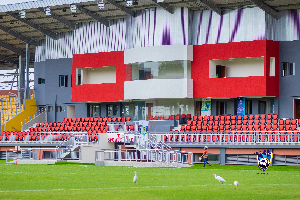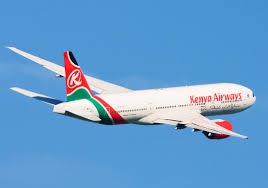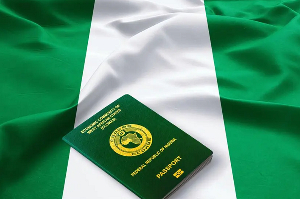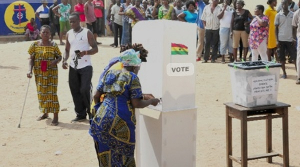- Home - News
- TWI News | TV
- Polls
- Year In Review
- News Archive
- Crime & Punishment
- Politics
- Regional
- Editorial
- Health
- Ghanaians Abroad
- Tabloid
- Africa
- Religion
- Election 2020
- Coronavirus
- News Videos | TV
- Photo Archives
- News Headlines
- Press Release
General News of Friday, 22 January 2010
Source: Police Public Affairs Directorate
Non-interference in the operations of Police Service - Veep
His Excellency, the Vice President, John Dramani Mahama has re-iterated government’s commitment to non-interference in the operations of the Police Service. In his speech at the National Police Command Conference at the Police Headquarters on Friday, 22nd January 2010, the Vice President said “as a government we don’t intend to politicize the Police.
Delivering his speech at the Conference, which was under the theme: “Establishing Total Control in the Fight against Armed Robbery and Regaining Public Confidence and Trust” the Hon. Minister for the Interior, Mr. Cletus Avoka congratulated personnel of the Service for the success they chalked in armed robbery combat last year.
The Minister also used the opportunity to entreat all commanders of the Service to be proactive and work hanter, adding that promotion and recognition will be performance based. Touching on the perennial accommodation problem facing the Service, Honourable Cletus Avoka said that Parliament has given approval for budge to complete all suspended or abandoned Police projects. He also emphasized the commitment of government to provide the Police with their needs, both in terms of man-power and logistics for effective operations. The conference which is being attended by all Regional Police Commanders and other Unit Commanders will take stock of Police operations and activities for the past year, and forge a way ahead this year. ...full text of the IGP Mr. Paul Quaye’s address at the Conference ? Your Excellency the Vice President, ? The Honourable Minister for the Interior, ? Members of the Police Council, ? The National Security Advisor, ? Members of the Headquarters Management and Advisory Board, ? Regional Police Commanders, ? Senior Police Officers, ? Members of the Press, ? Ladies and Gentlemen: Introduction I am delighted and honoured this morning to perform the traditional responsibility of welcoming His Excellency the Vice President and Chairman of the Police Council, some members of the Council, the National Security Advisor and also all Regional Police Commanders, to the Police Headquarters, for the opening ceremony of the National Police Command Conference. On my own behalf, and on behalf of the Police Headquarters Management and Advisory Board, I take this opportunity to wish you all a belated Happy New Year as well. General purpose of the Conference The National Police Command Conference is an annual assembly of all Police Commanders from the eleven (11) Police Regions of the country and members of the Police Headquarters Management and Advisory Board (HEMAB). Its main aim is to identify critical and key policy issues of priority concern to the Police Administration in relation to effective and efficient enforcement of law and order in the country. It is a forum where stock is taken of the preceding year’s operational and administrative activities and projections made towards the implementation of the current year’s plans and programmes. Such analysis helps us to take necessary steps to rectify any negative variances that may occur in our performances against defined operational targets.
Even though the Headquarters Administration is in regular contact with Regional Commanders through administrative circulars, directives, wireless messages, tele-conferencing and telephone communications, the importance of the human element in the process of communication and feedback cannot be overlooked. This need strongly underscores the holding of Conferences such as this. It is a good opportunity for Commanders to meet under the same roof to share critical thoughts on pressing operational and administrative issues within the framework of our major policies. Besides, the Conference provides a forum for renewing professional commitments of solidarity and team work and also facilitates the fostering and strengthening of the bonds of co-operation, interpersonal relationships and espirit de corps. The Conference is also a platform for Regional Commanders to share professional experiences and discuss peculiar policing challenges in their respective geographical areas of responsibility. The benefits of cross-fertilization of professional ideas and the open brainstorming opportunities which the Conference will offer, will at the end of the day, help in the formulation of critical strategies and policies for improved performance in combating crime and maintaining law and order. Thematic Focus of the Conference The key issues of focus for this year’s Conference are succinctly captured in the theme: “Establishing total control in the fight against armed robbery and regaining public confidence and trust”. It will be recalled that during the second quarter of 2009, some parts of the country were gripped with foreboding fear, anxiety and insecurity due to a phenomenal increase in the incidence of armed robbery. The robberies were not only perpetrated in most major cities and towns but also on the highways. The callous perpetrators of these brutal acts of violence robbed families and households of their valuables and also committed naked acts of torture, murder, rape, etc. These worrying incidents tended to erode the confidence that the public had in the Police as their constitutionally mandated protectors. However, with the initiation of pragmatic strategies by the Police Administration and ready operational support from sister security organisations, especially the Military, the menace of robberies was dealt with decisively. It has since been our avowed commitment to install efficient structures, devise effective strategies and initiate sustainable operational tactics that will save the country from degenerating back into that era when the apostles of violent criminality took the country for a ride. We are sparing no effort to ensure that criminals who, as agents of the under-world, operate with ruthlessness against law-abiding citizens, are brought to book to face the full rigours of the law. This is what informed the wording of this year’s theme for the conference. Introducing a Strategic Plan Your Excellency, this year’s Conference is unique for two main reasons. It is the first since my appointment as the Inspector-General of Police and secondly it affords us the opportunity to introduce the five-year Strategic Plan of the Ghana Police Service formally to all Regional Commanders. The Strategic Plan, which, was prepared in 2008, did not get the needed support for its implementation. It was therefore shelved and had to be revised and updated to meet current conditions and institutional requirements. This Plan incorporates projections aimed at raising a Police Service of a world-class standard that is all-time ready to face any challenges likely to disturb the peace and tranquillity of the State. This is to ensure that the citizenry is well protected at all times to enable them go about their legitimate economic, social and political pursuits of life without undue hindrances by societal delinquents and avowed agents of violent criminality and lawlessness. Reducing the number of Prisoners in Remand Custody As an institution, we have been accused from all angles of a multiplicity of unprofessional practices including prolonged detention of suspects and a habitual failure to produce these same persons before court. Without doubt, these accusations constitute reprehensible indictments on our human rights records. We are confronted with cross-institutional bottlenecks in our bid to resolve this problem. The Courts, Attorney-General’s Office, the Prison Service and the Ghana Police Service all have their fair share of these bottlenecks that compound the problem.
It is worrying to state that apart from the risks posed by such routine escorts, we lack the logistic capacity, in terms of specialised “Black Maira” vehicles to escort a large number of prisoners indicted for felonies on distant and stressful journeys. It is therefore imperative that we work collectively as partners in the criminal justice system to put in place effective and reliable mechanisms to ameliorate the current situation. We in the Police Service know that it is professionally and ethically unacceptable to dump accused persons in remand custody without following the cases to their logical conclusions in the trial processes. But to some extent, it has been happening. This Conference will, among others, therefore sensitise Commanders on the current situation and the remedial measures being put in place at the highest levels to resolve the crisis. Highlighting the main problems confronting us Your Excellency: As earlier hinted, the Conference will address the most pressing challenging issues that confront the Service. I am referring, in particular, to the acute shortage of accommodation facilities, inadequate communication equipment, insufficient number of vehicles for patrols and other policing duties, etc. Commanders are certainly aware that efforts are being made to secure decent accommodation for personnel but the extent of progress made so far, impact on our budgetary allocations and details of Government commitments perhaps need to be disseminated in detail. The perennial problems of inadequate budgetary allocations and the consequent insufficient logistical support for the Police Service have become a formidable drawback on our performance in the fight against crime. Budgetary constraints have over the years compelled the Service to abandon the completion of many infrastructural projects. Similarly, several training programmes and strategies aimed at enhancing our skills in crowd control, democratic policing, etc have been nipped in the bud.
Vehicles, communication and other forms of crime-combating equipment are very crucial in the effective maintenance of law and order. Happily, I can announce here that Government has called for a critical review and updating of the Strategic Plan and has already started providing some essential resources necessary to facilitate its implementation. Embarking on an image cleansing crusade The Police Administration has resolutely embarked on image-cleansing crusade this year. This is because it is a fact that most of our current problems are correlatively linked to our dented image. Several factors have cumulatively accounted for the poor public image of the Service. We are perceived in several quarters as corrupt, brutal, human rights-unfriendly, inefficient and low-calibred. Most of these accusations may have some iota of truth in them; others are based on stereotyped perceptions and distorted lenses following the actions and inactions of a few inept police officers and men. It is a matter of pride, however, to say that the Service has within its ranks, a large number of personnel with impeccable moral characters and whose sterling professional qualities and backgrounds are comparable to the best in other institutions in this country. Many of our officers have proved their mettle, both locally and on the international scene. It is regrettable that the unacceptable behaviours of a handful of our personnel have given causes for the public to have negative perceptions that the average policeman is of a mediocre calibre and an under-achiever with no moral strength of character. We are determined to work hard to reverse these negative perceptions. We are working pragmatically to project our image in fostering close links with the citizenry. Attributes of professionalism, fairness, honesty and transparency in the delivery of policing service throughout the country will therefore be encouraged and promoted. In this regard, I must warn that personnel who exhibit tendencies of non-compliance with directives relating to our image-improvement strategies will have themselves to blame. Adopting the Problem Solving Policing Strategies In line with our image redemption interventions, we are strategising to adopt problem-solving policing approaches. We want every person who walks into a police station or office with a problem to receive the best services available. This implies that officers will have to make special efforts to promptly respond to issues and resolve those within their authority and competence in the most professional manner possible. In cases where they are unable to find immediate solutions, they would politely advise on alternative avenues where reliefs can be obtained. Your Excellency, Honourable Minister, Distinguished Guests, Fellow Officers: Let me conclude by emphasising that we have an onerous constitutional mandate to perform our traditional policing functions, which most importantly include the protection of life and property and the apprehension and prosecution of hardened criminals. We cannot afford to fail our country. But we cannot effectively achieve our constitutional objectives without the much-needed support and co-operation of the people whom we are expected to protect, hence the need to regain their confidence and trust. How we succeed in this enterprise essentially depends on our approaches to policing in the democratic environment in which Ghana currently operates.
On this note, I take the opportunity, once again, I say welcome to all of you. I hope we shall have very fruitful deliberations at this Conference.
Thank you. Source: Police Public Affairs Directorate










